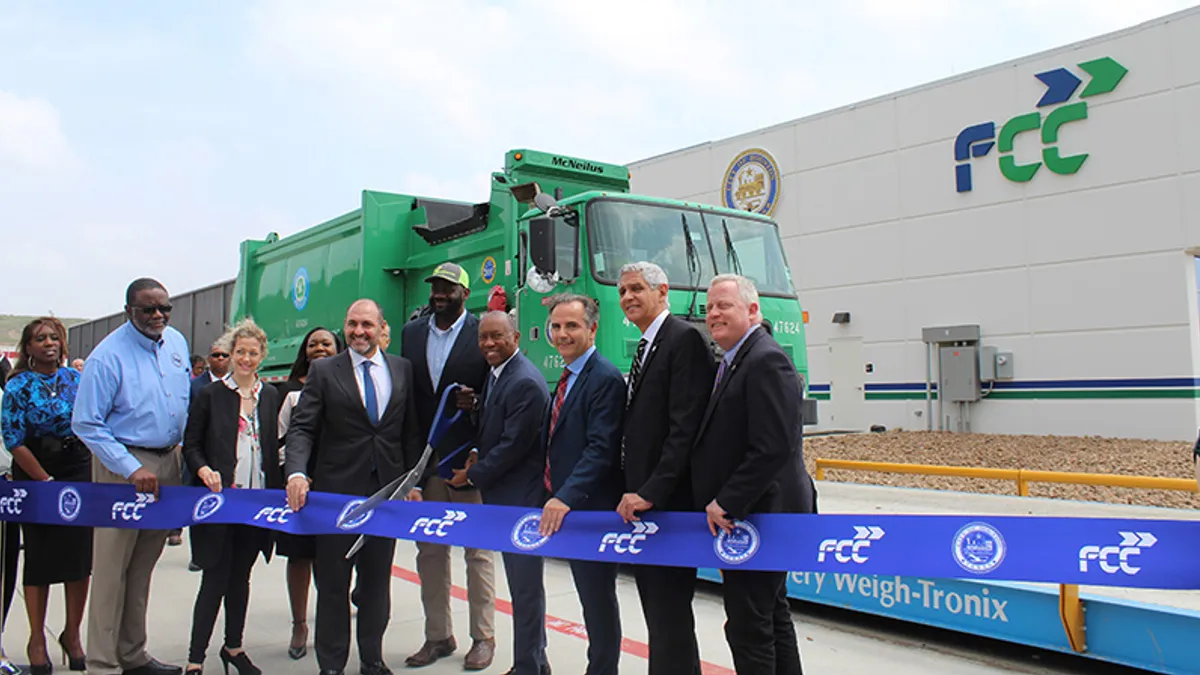Dive Brief:
- FCC Environmental has officially begun servicing Houston's residential recycling contract at a newly constructed MRF in the city. The occasion was commemorated with a ribbon cutting on April 4, attended by the CEOs of FCC's U.S. and global arms, along with Mayor Sylvester Turner and other officials.
- This means Houston residents' curbside glass will be recycled for the first time in three years, after the service was suspended under a prior deal with Waste Management. The Houston Chronicle reports that collected glass has been getting recycled since March 11, following the facility's opening.
- FCC is operating the 120,000-square-foot facility, which has an annual capacity for 145,000 tons of material, under a city contract that could run up to 20 years. FCC's processing fee is $87.05 per ton, and it will only charge the city a maximum of $19 per ton if commodity values don't offset that. Any net revenue will be split.
Dive Insight:
Waste Management, which has long handled much of Houston's residential recycling, was among the finalists for this latest contract, but was ultimately dismissed by the Turner administration over two key reasons: glass and pricing. Waste Management's general aversion to glass recycling is well-documented in many states around the country, and the city dropped it at the company's request in 2016. As for the cost, Vice President of Recycling Brent Bell told Waste Dive in March 2018 that the company "absolutely can't guarantee a floor price for material anymore" given the post-China commodity market outlook.
All of this played out during a bruising process that spanned more than six months from the time when Turner announced his preference for FCC to when the company was finally awarded the $36.8 million deal in Jan. 2018. The initial panic after China's import restrictions were announced served as a backdrop throughout. Turner cited FCC's stable pricing as a positive amid the market uncertainty, and the company actually lowered its rates in final bidding. However, multiple city council members still weren't convinced by the end.
At the time, a now-former FCC executive told Waste Dive, it all came down to a company philosophy that "recycling should never be more expensive than putting material in the landfill." Shortly after, during a conference presentation, financial analyst Michael E. Hoffman noted, "The math doesn’t work, they’re being subsidized by their parent corporation." Last fall, at a municipal waste conference in the city, Turner estimated the new FCC deal would be as much as 67% less expensive than the current Waste Management contract.
FCC Environmental is the U.S. division of global giant FCC Group. In the past five-plus years, FCC has established a U.S. presence that includes a new MRF in Dallas and 13 municipal contracts across Texas and Florida. The most recent addition was a $215 million deal in Florida's Palm Beach County.
While the company has been successful in supplanting larger U.S. players for some of these deals, this Houston contract is by far its most notable yet. FCC will move its national headquarters to the city and can also make the case that it's finding solutions for glass at a time when many others are walking away. The brand new MRF includes a glass cleanup system from Van Dyk Recycling Solutions and is located near regional buyers, including Houston-based Strategic Materials.
Despite all the positive press around this new chapter for Houston recycling, there is still one more wild card. EcoHub, which has a mixed waste processing concept that was poised to handle the city's material under a former mayor, maintains it was boxed out by the Turner administration. The company has been engaged in a legal battle since 2017 over public records requests for emails about the contracting process. Last week, on the same day as the ribbon cutting, EcoHub filed a motion for summary judgment to see emails that have yet to be disclosed and recoup legal costs. A hearing is scheduled in county court on April 29.










